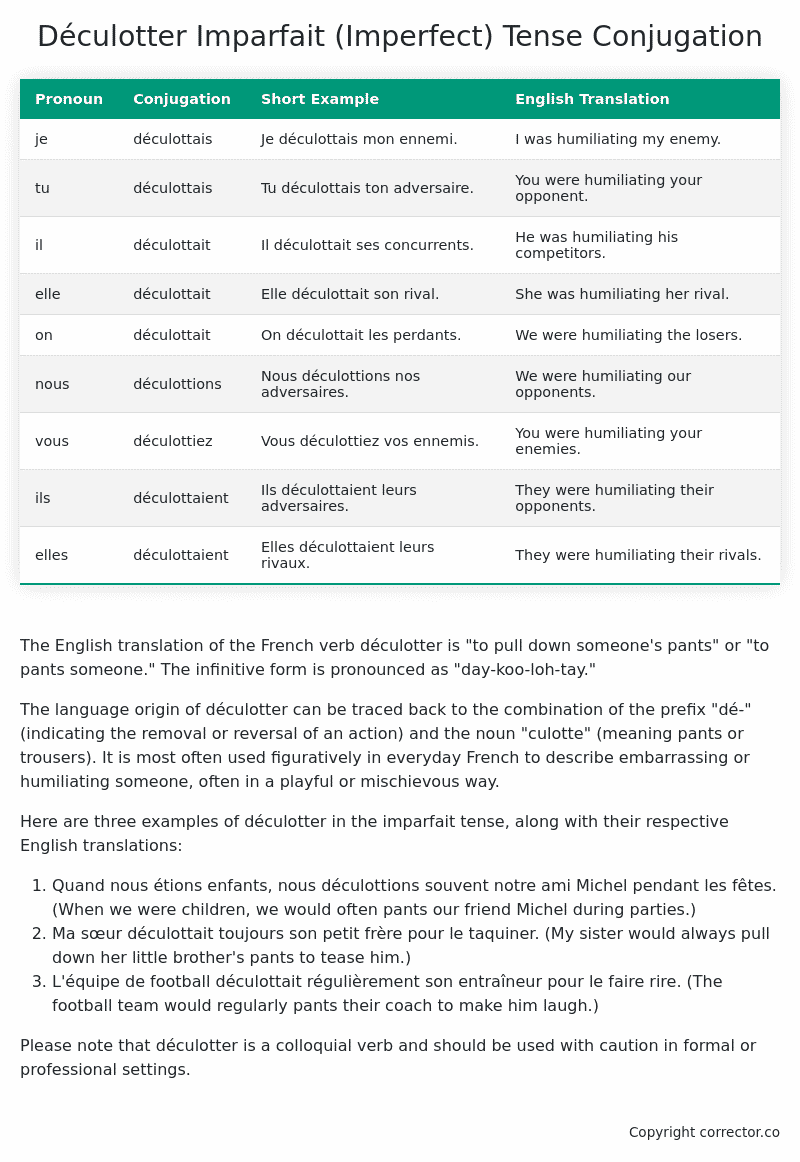Imparfait (Imperfect) Tense Conjugation of the French Verb déculotter
Introduction to the verb déculotter
The English translation of the French verb déculotter is “to pull down someone’s pants” or “to pants someone.” The infinitive form is pronounced as “day-koo-loh-tay.”
The language origin of déculotter can be traced back to the combination of the prefix “dé-” (indicating the removal or reversal of an action) and the noun “culotte” (meaning pants or trousers). It is most often used figuratively in everyday French to describe embarrassing or humiliating someone, often in a playful or mischievous way.
Here are three examples of déculotter in the imparfait tense, along with their respective English translations:
- Quand nous étions enfants, nous déculottions souvent notre ami Michel pendant les fêtes. (When we were children, we would often pants our friend Michel during parties.)
- Ma sœur déculottait toujours son petit frère pour le taquiner. (My sister would always pull down her little brother’s pants to tease him.)
- L’équipe de football déculottait régulièrement son entraîneur pour le faire rire. (The football team would regularly pants their coach to make him laugh.)
Please note that déculotter is a colloquial verb and should be used with caution in formal or professional settings.
Table of the Imparfait (Imperfect) Tense Conjugation of déculotter
| Pronoun | Conjugation | Short Example | English Translation |
|---|---|---|---|
| je | déculottais | Je déculottais mon ennemi. | I was humiliating my enemy. |
| tu | déculottais | Tu déculottais ton adversaire. | You were humiliating your opponent. |
| il | déculottait | Il déculottait ses concurrents. | He was humiliating his competitors. |
| elle | déculottait | Elle déculottait son rival. | She was humiliating her rival. |
| on | déculottait | On déculottait les perdants. | We were humiliating the losers. |
| nous | déculottions | Nous déculottions nos adversaires. | We were humiliating our opponents. |
| vous | déculottiez | Vous déculottiez vos ennemis. | You were humiliating your enemies. |
| ils | déculottaient | Ils déculottaient leurs adversaires. | They were humiliating their opponents. |
| elles | déculottaient | Elles déculottaient leurs rivaux. | They were humiliating their rivals. |
Other Conjugations for Déculotter.
Le Present (Present Tense) Conjugation of the French Verb déculotter
Imparfait (Imperfect) Tense Conjugation of the French Verb déculotter (You’re reading it right now!)
Passé Simple (Simple Past) Tense Conjugation of the French Verb déculotter
Passé Composé (Present Perfect) Tense Conjugation of the French Verb déculotter
Futur Simple (Simple Future) Tense Conjugation of the French Verb déculotter
Futur Proche (Near Future) Tense Conjugation of the French Verb déculotter
Plus-que-parfait (Pluperfect) Tense Conjugation of the French Verb déculotter
Passé Antérieur (Past Anterior) Tense Conjugation of the French Verb déculotter
Futur Antérieur (Future Anterior) Tense Conjugation of the French Verb déculotter
Subjonctif Présent (Subjunctive Present) Tense Conjugation of the French Verb déculotter
Subjonctif Passé (Subjunctive Past) Tense Conjugation of the French Verb déculotter
Subjonctif Imparfait (Subjunctive Imperfect) Tense Conjugation of the French Verb déculotter
Subjonctif Plus-que-parfait (Subjunctive Pluperfect) Tense Conjugation of the French Verb déculotter
Conditionnel Présent (Conditional Present) Tense Conjugation of the French Verb déculotter
Conditionnel Passé (Conditional Past) Tense Conjugation of the French Verb déculotter
Conditionnel Passé II (Conditional Past II) Tense Conjugation of the French Verb déculotter
L’impératif Présent (Imperative Present) Tense Conjugation of the French Verb déculotter
L’impératif Passé (Imperative Past) Tense Conjugation of the French Verb déculotter
L’infinitif Présent (Infinitive Present) Tense Conjugation of the French Verb déculotter
L’infinitif Passé (Infinitive Past) Tense Conjugation of the French Verb déculotter
Le Participe Présent (Present Participle) Tense Conjugation of the French Verb déculotter
Le Participe Passé (Past Participle) Tense Conjugation of the French Verb déculotter
Struggling with French verbs or the language in general? Why not use our free French Grammar Checker – no registration required!
Get a FREE Download Study Sheet of this Conjugation 🔥
Simply right click the image below, click “save image” and get your free reference for the déculotter imparfait tense conjugation!

Déculotter – About the French Imparfait Tense
NOTE: To take a deep dive into all the French tenses then see our article on Mastering French Tense Conjugation.
Formation of the Imparfait Tense
For regular -er verbs:
For regular -ir verbs
For regular -re verbs
Common Everyday Usage Patterns
Description of Past Habits
Background Information
Mental and Emotional States
It’s employed to express emotions, thoughts, or physical sensations in the past. For example: “J’étais content quand il est arrivé.” (I was happy when he arrived.)
Ongoing Actions
Points to Note About the Imparfait Tense
Passé Composé vs. Imparfait
Conditional
Si Clauses
Narration
I hope you enjoyed this article on the verb déculotter. Still in a learning mood? Check out another TOTALLY random French verb imparfait conjugation!


